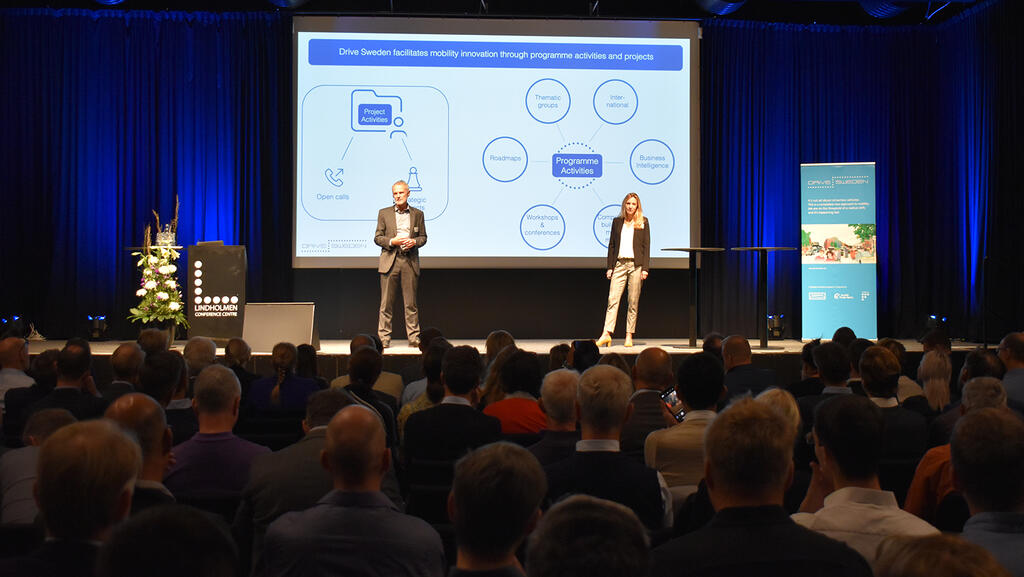New thematic areas presented at Drive Sweden Forum
Almost 300 people from most sectors affecting the field of mobility filled the conference hall at Lindholmen Science Park on September 12 when the Drive Sweden Forum was arranged. The day gave insights about how mobility is evolving, what is needed to take new next steps for the future and how Drive Sweden’s new thematic areas can provide an excellent framework for this.

The day was opened by director Sofie Vennersten, that introduced the five thematic areas just adapted by Drive Sweden: business models, society planning, digital infrastructure, policy development and public engagement.
The structure represents different perspectives of the transport and mobility sector, all leading towards our mission to drive the development towards sustainable mobility solutions for people and goods by creating and demonstrating efficient, connected and automated transport systems. The thematic areas also create prerequisites for collaboration between partners and facilitate the identification of needs and challenges that needs to be solved in cooperation.
Business models for the future
The opening speaker, David Green, Chief Digital Officer at the new Drive Sweden partner Lynk&Co, shared his company’s take on the revolution within the car industry and the car as a service. Their work to understand their target group and its’ vision of the society of tomorrow led to a new business model, in line with Drive Sweden’s vision, where openness to other actors became an important building piece.
How the business models are changing got further attention from Roland Elander, Sustainable Innovation, Rami Darwish, ITRL/KTH and through a panel discussion with representatives from SnappCar, Folksam, DHL and CEVT. A few things that were raised were the new Drive Sweden business model lab as well as how players on the market are adapting to services that used to be b2b that now are becoming b2c to a larger extent. This push for new business models, new ways of using larger quantities of data and a new take on consumer value and cooperations. Or as Mikael Rönnholm from CEVT, from now on active in the Program Office of Drive Sweden, put it:
– We need to find new ways of delivering consumer value and to collaborate with peer actors and start-ups. And we need to get out and do things and challenge the rules.
Policy development
The rules in question are being challenged, which was something that Kent Eric Lång and Håkan Burdén from Rise talked about. Håkan presented the Project PLATT, that has investigated several ways of updating or changing policies to become more up to date and in closer contact with technical innovation. While working with this, they pinpointed trust between policymakers and companies as one of the most important factors for being successful. If there is not enough trust, the willingness to contribute may lack from both ends.
Drive Sweden’s upcoming policy lab will further investigate these questions and will be a unique arena for policy development. More information will follow!
An organization that has already started working with policy development is KOMET - the Committee for technological innovation and ethics. This committee was created by the Swedish government in 2018 and Anna Fridén gave us a glimpse of the work being carried out.
They aim to speed up the policy and legal development, to be more in tune with technological innovation. To do that, they have gathered a wide base of actors and even though their ethics based work is somewhat different they too have seen the need for trust - and inclusion – in order for a good conversation to begin. A conversation that has one eye on Agenda 2030 and one eye on innovation.
– We need to understand, experiment and transform. We need to find ways to help the society in not falling behind technological innovations, said Anna Fridén.
Public engagement and the society
The society and the citizens is getting an increased role as the cities evolve and the consumers’ needs and wishes with it. Vaike Fors from Halmstad University spoke about this and the how public engagement is an integral part of Drive Sweden. Their participatory multi-actor dialogues and co-creation with the citizens give us new data and insights that can effect most aspects of innovation, and society planning. The latter part was further explained by Suzanne Andersson representing the Urban Transport Administration, City of Gothenburg, and she too raised the importance of co-creation with citizens.
A plethora of knowledge - going international
On top of this, the audience also got to hear about the work wihtin Drive Sweden around the digital infrastructure and connected cloud services – Ericsson explained how the Drive Sweden Innovation cloud is taking new steps with 5G and new data – The Swedish Transport Administration’s new road map for a connected and automated road transport system, Future scenarios for the digitalized freight transport sector, AI in the future transport system and Volvo’s autonomous city bus.
Last but not the Forum was ending with some information about the new open call (open until November 5th) and that Drive Sweden is going international.
The Drive Sweden team would like to thank all visitors and speakers for yet another great forum and we look forward to seeing you all again on February 6!
The presentations of the day (pdf)
The transformation of tomorrow's mobility - David Green, Lynk & Co
Policy development - How can we adapt the rules together? - Kent Eric Lång, RISE
Digital infrastructure and connected cloud services - Stefan Myhrberg, Ericsson
AI in the future transport system - Martin Svensson, AI Innovation of Sweden, Mats Nordlund, Zenuity
Volvo Autonomous city bus - Joakim Jonsson, Volvo Buses


